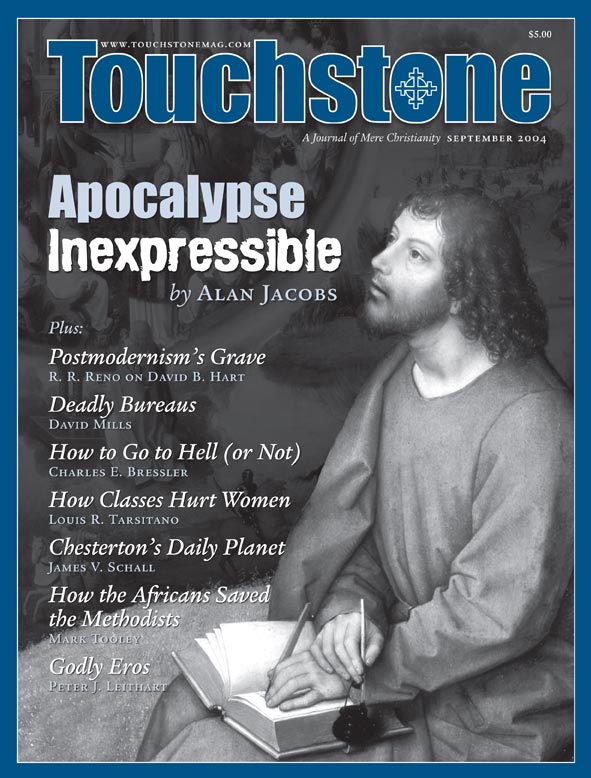Reorganizing Religion
Why the Church Bureaucracies Have to Go
by David Mills
A few years ago, a high official in the Church of England announced that the new prayer books would cost the parishes millions of pounds but the Church of England would make a small profit. It was a slip, of course, but one that revealed how deeply those at the center of the Western churches identify their central structures with the churches themselves.
This is a very bad mistake, because these structures have an unfair advantage over the local and personal, from which the most effective, and generally the most orthodox, ministry come. They take from them more than they give, and misdirect their resources and energies even when acting quite sincerely and with the best of intentions. They are the sort of friend who “for your own good,” weeds your library, changes the settings on your computer, replaces your furniture, and rearranges your finances—and then charges you a large fee for doing so because “we’re all in this together.”
Abandon It
Any revival in these churches will require not the reform but the abandonment of the many layers of bureaucracy they have built up over the last few decades, giving the local bodies the authority to act as they think best and forcing the center to be as close as possible to the local bodies, in particular guiding, aiding, and inspiring them far less by law—giving requirements, for example—than by personal authority, and to rely for its support on the voluntary giving of the flocks it serves.
I am not criticizing bureaucracy as such, because it is natural and inevitable. A bishop begins a diocesan bureaucracy as soon as he hires a secretary or convenes a small group to help him with the finances. But some subtle line is crossed, and crossed quickly, when these people and their work become authorities in their own right and work more by rule and process than personal relation.
It is crossed, for example, when the bishop appoints someone because he has to satisfy some political need—to satisfy powerful people in the diocese, for example—not because the man is godly, wise, and discerning. It is generally being crossed when a bishop thinks he is being shrewd.
Bureaucracy is simply one way of getting things done, and the questions to be asked of it are whether it does them well and whether it does other things than it is supposed to do. I want only to suggest that it is not the best form of organization for modern church life. The resources and energy these bureaucracies consume (not only from those who work in them but from those who must spend time and money to oppose them) and the ends to which they direct their work make it harder for the churches to bring the gospel to the people who need to hear it, and make it much harder for the churches to say the clear word the culture needs to hear from it.
Centralized structures can do many things much faster and with less effort than individuals can. Yet they are complex machines far more likely to break down and needing far more energy to run, and require such an investment that no one wants to junk them when they stop working. Even when they are working well, they tend to develop a mind of their own and sometimes to go where even their handlers do not (consciously) intend.
And individuals matter: The most complex bureaucracy run by St. Francis of Assisi will express in its life more of the gospel than the most personal system led by Machiavelli. A committee may be a fellowship helping others or a bureaucracy insisting on its own way, depending on the man who appointed its members and the people he appoints.
David Mills has been editor of Touchstone and executive editor of First Things. He edits the opinion page of the Pittsburgh Post-Gazette.
subscription options
Order
Print/Online Subscription

Get six issues (one year) of Touchstone PLUS full online access including pdf downloads for only $39.95. That's only $3.34 per month!
Order
Online Only
Subscription

Get a one-year full-access subscription to the Touchstone online archives for only $19.95. That's only $1.66 per month!
bulk subscriptions
Order Touchstone subscriptions in bulk and save $10 per sub! Each subscription includes 6 issues of Touchstone plus full online access to touchstonemag.com—including archives, videos, and pdf downloads of recent issues for only $29.95 each! Great for churches or study groups.
Transactions will be processed on a secure server.
more from the online archives
calling all readers
Please Donate
"There are magazines worth reading but few worth saving . . . Touchstone is just such a magazine."
—Alice von Hildebrand
"Here we do not concede one square millimeter of territory to falsehood, folly, contemporary sentimentality, or fashion. We speak the truth, and let God be our judge. . . . Touchstone is the one committedly Christian conservative journal."
—Anthony Esolen, Touchstone senior editor










